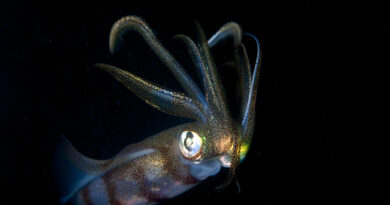Octopus Legionnaire
It has been about two and a half million years since humans first had the imagination to modify pieces of stone for their use as tools. Then, our ancestors were seemingly content with such technology for a long time, until about ten thousand years ago, when metal working first emerged. Some metals, as a function of their chemistry, came into use earlier than others; Gold and Copper were probably first. Aluminum, in contrast, is one of the most difficult to isolate metals. In the initial decades of the human ability to purify it, the procedure was so difficult and costly that Aluminum was more expensive than Gold. In the mid-1800s, The French emperor Napoleon III owned a special Aluminum dinner plate set reserved for special guests on special occasions. Only the advent of new electrochemical methods in the 1880s made this metal available for a variety of practical uses, like airplane construction and the mass manufacture of soft drink and conserved food cans.

This weekend I went scuba diving in Botany Bay, near Sydney, Australia, and observed an octopus using the disposed lid of such a can as a shield. The soft-bodied octopi often retreat into rock crevices for safety from predators, and this one held the aluminum lid he owned in front of himself, as a means of additional protection. This cephalopod’s possession rivaled that of the French emperor just a century and a half earlier. I can think of few examples showing more saliently how humanity’s technological activities have completely changed the surface of the earth. Thanks to us, even an – admittedly highly intelligent, but certainly pre-technological – invertebrate now gets to use tools made of a metal highly treasured by the emperor of one of the most advanced nations, only a few handfuls of generations ago. No Roman legionnaire or medieval knight could ever protect himself with a shield made of this light-weight metal. The octopus I saw could!
And, in case you think that I’m making this up, I posted some pictures of the metal-using mollusk.

Naturally, in history each step in the development of metal working brought on a new stage of military technology. The first tribes using metal armor and weapons held a great advantage over their unlucky stone-age neighbors. Later iron weapons trumped softer bronze weapons. Hence, will aluminum-wielding octopi emerging from Botany Bay take over the ocean world on all of the Australian east coast? Observational learning is known to occur in octopi, and there is certainly no shortage of human thrash in the ocean. Could this one octopus teach his mates to arm themselves with the metal thrash thrown into the ocean by human civilization? Unfortunately, octopi are no social creatures, and their life span is unusually short for such large-brained animals; too short for a great advantage from aluminum shield use to accumulate. I doubt that we will see octopus legions with shiny shields crawling along the reefs from Cairns to Melbourne in tight formation. But it’s still an amazing example of animal tool use, wrapped in one with a reminder of what dramatic changes we are causing to the whole planet.


